Christmas 1941 was little different for most Americans from that of the previous year, despite the calamity of Pearl Harbor only weeks before.
Both coasts had begun to post antiaircraft guns — some obsolete, others wooden fakes, only there for spurious confidence. Sentries, often bearing 1918-vintage rifles, were seen at railway stations and armaments factories. And anxiety about Japanese air raids had resulted in the relocation of the New Year’s Day Rose Bowl from Pasadena, California, to Durham, North Carolina, where Duke would play Oregon State.
Yet shops everywhere burgeoned with holiday goods; Christmas trees were plentiful; and in the traditional Christmas extravaganza at Radio City Music Hall in New York, the Rockettes worked hard to dance away any gloom.
Everywhere across the nation, the Japanese were being thwarted in the Terry and the Pirates comic strip, and Gary Cooper as Sergeant York was defeating the Germans single-handedly in the previous world war.
The hit book for Christmas giving, at a hefty $2.50, was Edna Ferber’s Reconstruction-era romance Saratoga Trunk. For the same price, war turned up bombastically and distantly in a two-disc set of the 1812 Overture, performed by Artur Rodzinski and the Cleveland Orchestra. Gift crates of oranges and grapefruit from Florida were $2.79 at Bloomingdale’s. Hattie Carnegie’s dresses began at $15, while the Rogers Peet menswear store offered suits and topcoats from $38. (At recruiting stations, the army was offering smart khaki garb gratis.)
Henri Bendel featured silk stockings at $1.25 a pair; stockings in the current wonder weave,“nylon,” sold for $1.65. Nylon stockings would be almost nonexistent by the following Christmas, when the fabric would be the stuff of parachutes. Among the Christmas toy glut, shops across America advertised a remote-control bomber, at $1.98, that ran along a suspended wire to attack a battleship.
The Japanese had not needed suspended wires at Pearl Harbor, or in the Philippines, Malaya, or Hong Kong. The Royal Navy’s principal ships in the Pacific were at the bottom of the Gulf of Siam, and the depleted American fleet had only two destroyers available between Vancouver and San Diego.
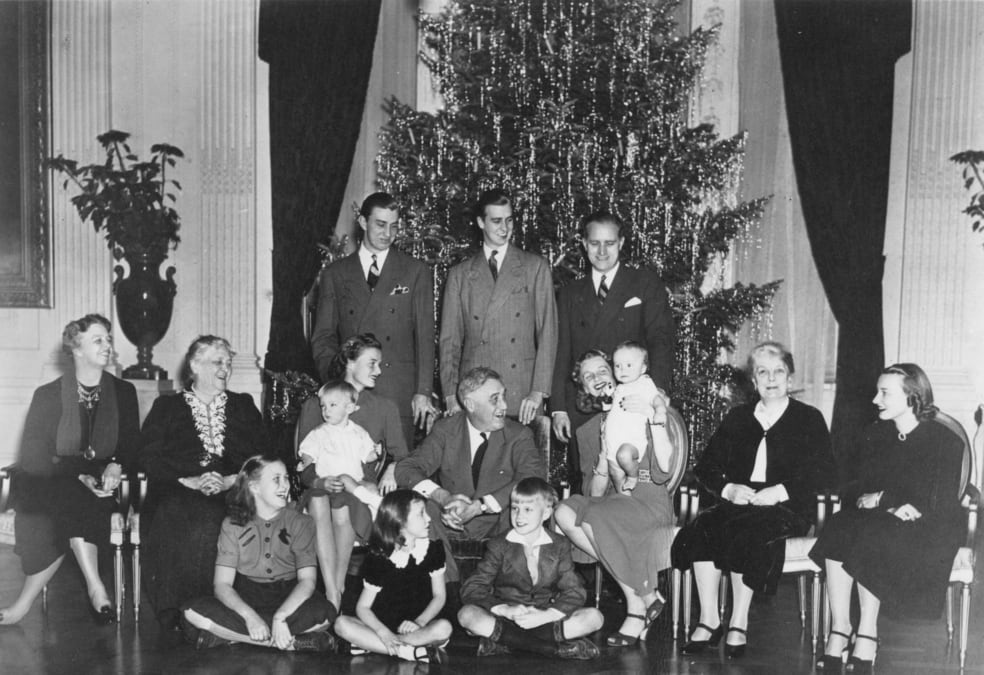
On the other side of the continent, Winston Churchill crossed the Atlantic on the new battleship Duke of York amid violent, frigid gales for a late December meeting with President Roosevelt. The American brass was worried about having the prime minister at the president’s elbow, where he could employ his glib persuasiveness and imperial visions despite his very weak hand.
At precisely 4:30 p.m. on Christmas Eve, as dusk gathered and the temperature dropped, the red-coated Marine Band on the White House lawn struck up “Joy to the World,” accompanying choirs from area churches. Thousands had gathered in the fading light. After some further carols, the band began “Hail to the Chief.”
As the sunset gun at nearby Fort Myer boomed, the president and Mrs. Roosevelt appeared on the South Portico with a group of guests, and only then did Churchill’s arrival in the United States become news. Roosevelt pressed a button signaling the lighting of the national Christmas tree, as if wartime blackouts elsewhere had no relevance.
The band encored “Joy to the World,”but there was little joy in Washington.
The British and American conferees worked through Christmas on joint planning, breaking in late afternoon for holiday dinner. Army chief of staff George C. Marshall, who rarely hosted formal dinners at Fort Myer, invited some of the British contingent. When Katherine Marshall discovered belatedly that December 25 was Field Marshal Sir John Dill’s birthday, she sent Sgt. James W. Powder, her husband’s paragon of efficiency, to find a cake and candles.
Despite holiday closings he returned with both, and also with miniature British and American flags to press into the icing. Dill, confiding that he had not had a birthday party since he was a small boy, plucked the flags to cut the cake and discovered they were stamped “Made in Japan.”
Then, because Powder had thought of (almost) everything, a Western Union messenger brought a singing telegram — which was intercepted by a Secret Service detail. There was wartime security somewhere.
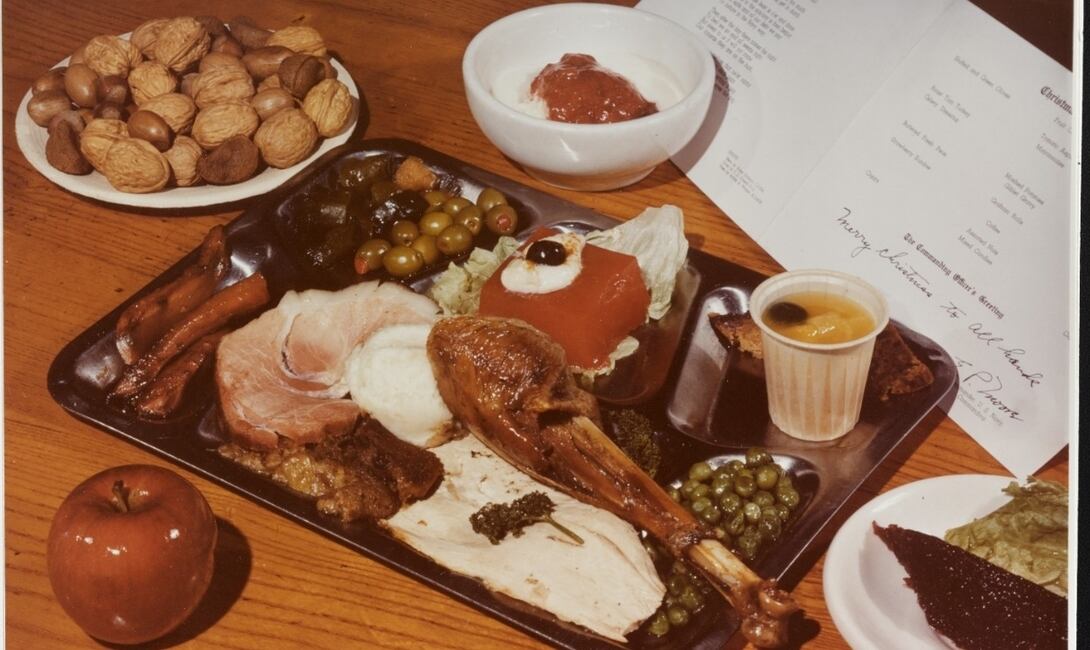
During the first full year of war, defense and withdrawal metamorphosed into offense and reoccupation, both in the South Pacific and the Mediterranean. The costs were showing up at home even in small things. Nationwide gas rationing began on December 1, 1942 (four gallons a month, later reduced to three); that and a 35 mph “Victory Speed Limit” kept holiday revelers close to home.
Although merchants were calling the 1942 Christmas tree supply “pre-war normal,” the number of fathers at home to buy, transport, and trim them had dwindled. In small town America, boys with absent heads of households were taken under the wing of World War I veterans from such organizations as the VFW and the American Legion. That year, and on wartime Christmases to come, these surrogate fathers delivered trees to blue- and gold-star houses and ensured that gifts materialized beneath them.
Many service fathers did not have much of a Christmas — particularly those who’d been taken prisoner in the Philippines and shipped, if they made it alive through December, to Japanese POW camps in Formosa and Manchuria. Maj. Gen. Edward P. King Jr., the commander of Filipino-American forces on Bataan, recalled a carol sing-along with other officer POWs and the special holiday treat they were given with their gruel: an apple.
That Christmas, Gen. Douglas MacArthur was supervising the retaking of New Guinea from his new command post in Australia. The commander of the Eighth Army, Lt. Gen. Robert Eichelberger, sent him a present from the front in Buna: a dead Japanese officer’s ornate sword. In French North Africa, which the Allies had invaded in early November, Lt. Gen. Dwight Eisenhower received a more significant gift.
The month before, he had made an odious but seemingly necessary deal to get the Vichy forces to surrender by appointing the chief collaborationist on the scene, Fleet Adm. François Darlan, as head of the French state. On Christmas Eve a young Frenchman named Fernand Bonnier de la Chapelle shot Darlan. He died on Christmas Day.
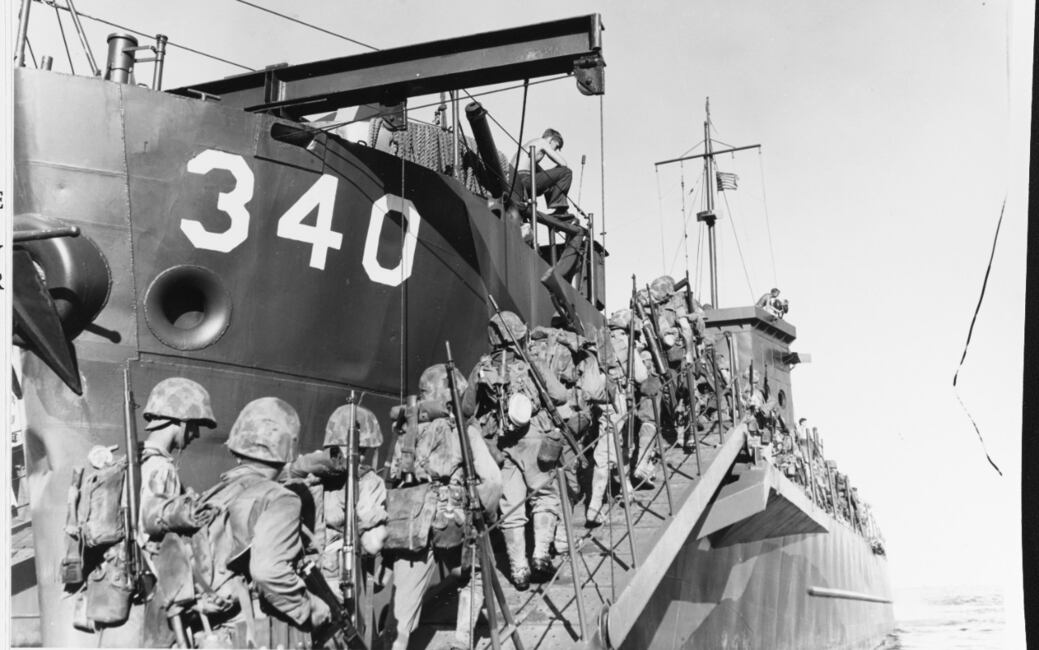
In mid-1943, Allied forces jumped from North Africa to Sicily, then to the boot of Italy. During Christmas 1943, while Anglo-American troops were clawing their way up Italy, Eisenhower and his staff were in Algiers, entertained by the visiting Winston Churchill, who was recuperating from pneumonia in a seaside villa Ike had provided. Presiding in a padded silk Chinese dressing gown, Churchill conferred there with high brass on Christmas Day about further landings in Italy. A festive luncheon followed, with turkey and plum pudding.
In the southwest Pacific, Americans involved in the costly island-hopping toward the Philippines and Japan were hardly aware of the holiday. On Bougainville in the Solomon Islands, soldiers and marines were fighting the tenacious Japanese ridge by ridge. The 1st Marine Division spent its Christmas on pitching LSTs before going ashore on New Britain the next day.
POW Edward King was at a small camp in Manchuria, where for Christmas the Japanese “gave us a little pork and a piece of bread.” The sixteen officers in the camp — British, Dutch, and American — improvised a religious service and sang what carols they remembered.
None of them would have known Irving Berlin’s “White Christmas,” which had been introduced by Bing Crosby the previous year in the film Holiday Inn and was now being broadcast by Armed Forces Radio everywhere Americans could listen.“I’ll Be Home for Christmas” was the latest hit, but, as the lyrics explained, that joyous return home might occur “only in my dreams.”
At home, metal toys for Christmas had nearly disappeared, along with bicycles, typewriters, alarm clocks, and other “hard goods” gift items large and small. In 1943, zinc had replaced copper in pennies, but kids expected more than the unfamiliar dull coins from Santa.
Opportunistic growers again loaded up on Christmas trees, raised prices, and (according to one overstocked wholesaler) “kept cutting right up to the night before Christmas.” While certain things were in short supply— bacon, butter, sugar, lamb chops, Kleenex, and new shoes, to name a few — Christmas trees weren’t among them. Ten million evergreens went unsold.
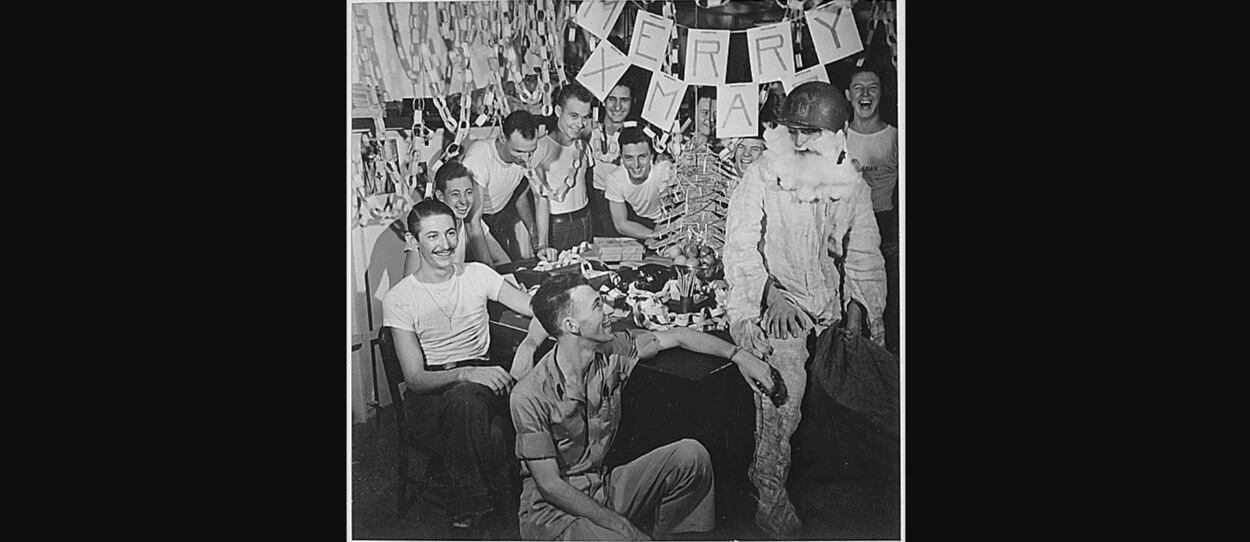
Following D-Day in June 1944, the home front began to smell victory ahead. That winter, the cost of Christmas trees dropped sharply. Trees that had been priced at $4 the year before were now $2.50, while trees sold “on the stump” ranged from 25¢ to 45¢, for the fewer fathers around to cut them. Continuing deprivations included silk for dresses, cuffs on trousers, whiskey for grownups, and bubblegum for kids.
The Office of Price Administration announced the return of canned vegetables to the ration list, and increased restrictions on butter, sugar, and meats. On Christmas Eve, President Roosevelt spoke to the nation and the armed forces by radio from his home at Hyde Park, saying,“The Christmas spirit lives tonight in the bitter cold of the front lines in Europe and in the heat of the jungles and swamps of Burma and the Pacific islands.”
From an NBC studio, Bob Hope broadcast to seamen on a Liberty ship about to weigh anchor for a Pacific destination, telling them that he knew it took courage to transport a cargo of ammunition. Terry of the Pirates strip risked his own white Christmas by flying munitions over the icebound Himalayan Hump to China.
“MacArthur’s men” — as he labeled all the troops in his command — were on Leyte in the central Philippines, where they had driven the Japanese into a corner of the island. On Christmas Eve, the general paced after dark on the veranda of an elegant house vacated by the enemy command.
As he puffed on his corncob pipe, a group of GIs gathered below to sing carols in a steamy climate and setting far removed from the typical American Christmas. Suddenly a low-flying Japanese nuisance raider buzzed over the compound.
The singing abruptly stopped, and soldiers dived for the hedges.
Then searchlights caught the intruder in their crossbeams and a burst of antiaircraft fire dropped it.
MacArthur leaned down to thank the returning carolers, and then resumed his pacing.
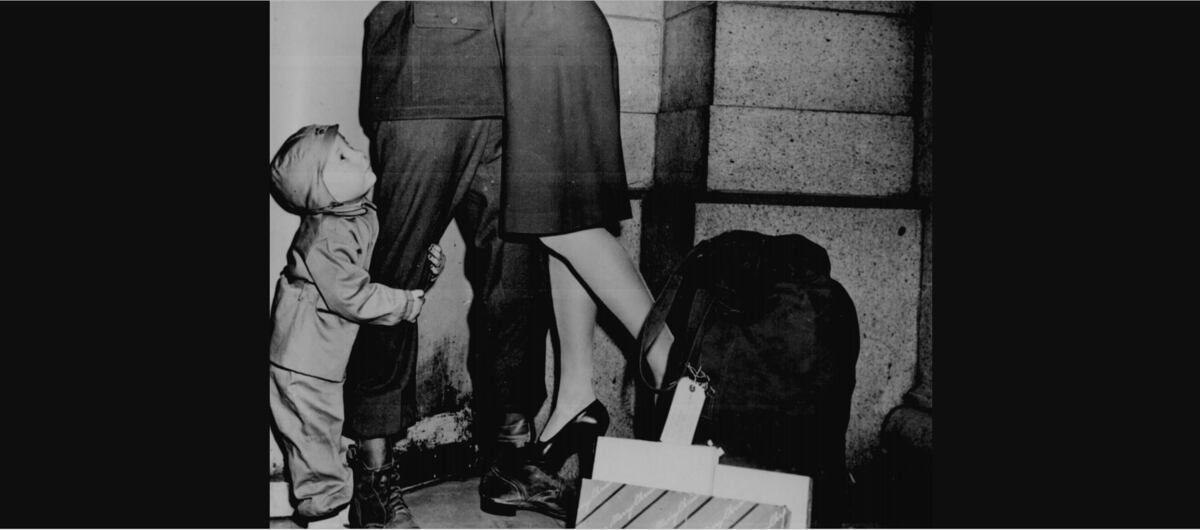
In Europe, Christmas brought the climax of “the Bulge,” the dismaying German surprise attack in the forest of the Ardennes that added further misery to a harsh winter. In the days approaching it, only the encircled and bypassed crossroads town of Bastogne stood between the Wehrmacht and the banks of the Meuse. But on December 23, the snowy skies cleared briefly, and previously grounded supporting aircraft could finally pound the enemy.
For many beleaguered Americans it was already too late. Two regiments of the 106th Infantry Division and much of the 28th Infantry Division had been shattered, and thousands of GIs — those still alive — would spend a cold Christmas in windowless boxcars clattering eastward toward German prison camps.
RAF bombers interdicted one train on December 25, killing sixty Americans, including two doctors. Survivors kept spirits up by singing carols; a fortunate few received a potato for Christmas. (Some POWs held in the United States that Christmas fared a good bit better. At Fort Dix, New Jersey, twenty-one lightly secured Italian POWs escaped, had Christmas dinners with hospitable families nearby on whose farms they had worked, and returned happily to camp to face useless AWOL charges.)
Undeterred by the weather, Lt. Gen. George S. Patton’s Third Army was pushing north to relieve Bastogne and break the German siege. They were still on the move on Christmas Day, when Patton jeeped among his units in the snow to ensure that, at the least, his troops got hot turkey sandwiches with gravy.
It may not have been much, but it would have been a feast to POW Edward King — now in occupied China — who knew it was Christmas only because of the marks he made on a crude notebook calendar.
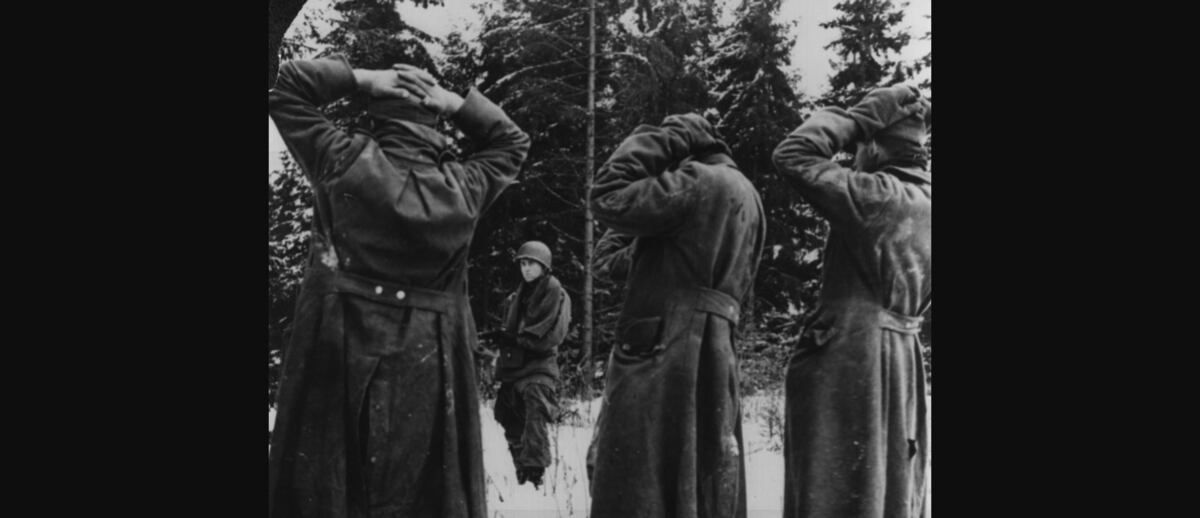
Patton hurried off between inspections to placid Luxembourg City, enjoying Christmas dinner at Gen. Omar Bradley’s well-stocked mess at the Alfa Hotel, where his staff trimmed a tree with scraps from the tinted window of a downed bomber.
On Christmas Day at Eisenhower’s headquarters in Versailles, the mess offered roast turkey with all the traditional trimmings, and champagne. The general opened his gifts from home, including fancy bedroom slippers from Mamie.
Far to the east, the battle to flatten the Bulge still raged. When tanks from Patton’s 4th Armored Division at last broke through into Bastogne, a crewman climbed out to greet Brig. Gen. Anthony McAuliffe, acting commander of the 101st Airborne Division. “Gee, I am mighty glad to see you,” said the general.
It was just one day too late for “Merry Christmas!”
This story was originally published in the December 2007 issue of World War II Magazine, a sister publication to Military Times.





